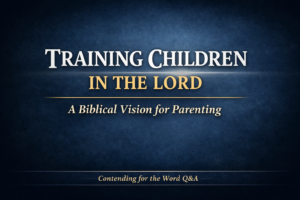⏱️ Estimated Reading Time: 3 min read
1 Kings 16 – A Legacy of Rebellion in Israel
Reading the Bible Daily with Dave • Monday, August 11, 2025
Show Summary: In 1 Kings 16, Israel’s kings plunge deeper into rebellion—from Baasha to Ahab—yet God’s Word stands firm. Dave Jenkins unpacks this sobering chapter, showing the dangers of ungodly leadership, the compounding effects of sin, and the hope found in Christ, the faithful King.
Introduction
Welcome back to Reading the Bible Daily with Dave. I’m Dave Jenkins, and today is August 11, 2025.
In 1 Kings 16, we witness the ongoing spiritual collapse of the northern kingdom of Israel. The chapter records a series of short and sinful reigns, each marked by idolatry, violence, and apostasy. Ultimately, we’re introduced to Ahab, a king whose evil surpasses all those before him. This chapter is a sobering reminder that ungodly leadership multiplies destruction, but also that God is not silent. He sends His Word through the prophets and preserves His purposes despite rebellion.
Scripture Reading – 1 Kings 16:1–34 (ESV)
Exposition & Interpretation
- Verses 1–7 – Baasha’s Judgment: Though Baasha wiped out Jeroboam’s line, he followed in Jeroboam’s sins. God’s judgment comes through Jehu’s prophecy.
- Verses 8–14 – Elah’s Drunken Demise: Reigns only two years before Zimri assassinates him while drunk.
- Verses 15–20 – Zimri’s Seven Days of Terror: Wipes out Baasha’s household, fulfilling prophecy, but dies by suicide in the palace fire when Omri rises against him.
- Verses 21–22 – Civil War: Israel splits between Tibni and Omri until Omri prevails.
- Verses 23–28 – Omri’s Reign: Builds Samaria; “did more evil than all who were before him.”
- Verses 29–34 – Ahab: The Pinnacle of Evil: Marries Jezebel, promotes Baal worship, builds a temple for Baal, and provokes the Lord more than any before him. Jericho is rebuilt under a curse, showing deep rebellion.
Key Themes
- God Judges Leaders
- Rebellion Begets Rebellion
- Prophetic Word Stands
- Political Power Without Righteousness Fails
- Ahab’s Apostasy Sets the Stage
Biblical Theology Connection
- Deuteronomy 17:14–20
- Joshua 6:26
- 2 Thessalonians 2:3–4
- Romans 1:18–32
- Luke 4:25–26
Christ-Centered Application
These kings failed, but Christ is the faithful King who reigns in righteousness. He does not exploit power—He serves and saves (Mark 10:45). In contrast to Ahab, Jesus never bowed to idols but lived in perfect obedience to the Father. In a world like Israel under Ahab, the Church must hold fast to Christ and speak His truth boldly.
Takeaways for Daily Life
- Private: Repent quickly of any pattern of compromise or rebellion.
- Home: Lead with righteousness, not passivity or fear.
- Church: Beware of worldly influence; stand firm on the Word.
- Work: Integrity matters; don’t chase advancement at the cost of truth.
- Culture: Speak against spiritual drift with compassion and conviction.
For Leaders, Teachers, and Counselors
- Use this chapter to contrast human leadership vs. divine authority.
- Teach the danger of normalized sin—Ahab’s reign shows how rebellion can become mainstream.
- Remind listeners: God raises up prophets in every age to call His people back to truth.
Questions for Reflection
- Why does God allow such evil kings to reign?
- What does the rise of Ahab teach us about spiritual decline?
- How do we respond to leadership failure in our generation?
Memory Verse
“And Ahab the son of Omri did evil in the sight of the Lord, more than all who were before him.” — 1 Kings 16:30
Outro
Thanks for joining me today on Reading the Bible Daily with Dave. 1 Kings 16 is a grim chapter—but it prepares us for the hope of God’s intervention through the prophets. In every generation, He raises up truth-tellers and preserves His people.
For more devotionals and resources, visit: servantsofgrace.org/reading-the-bible-daily-with-dave
Subscribe on Apple Podcasts, YouTube, or your favorite platform.
Dave Jenkins is happily married to his wife, Sarah. He is a writer, editor, and speaker living in beautiful Southern Oregon. Dave is a lover of Christ, His people, the Church, and sound theology. He serves as the Executive Director of Servants of Grace Ministries, the Executive Editor of Theology for Life Magazine, the Host and Producer of Equipping You in Grace Podcast, and is a contributor to and producer of Contending for the Word. He is the author of The Word Explored: The Problem of Biblical Illiteracy and What To Do About It (House to House, 2021), The Word Matters: Defending Biblical Authority Against the Spirit of the Age (G3 Press, 2022), and Contentment: The Journey of a Lifetime (Theology for Life, 2024). You can find him on Facebook, Twitter, Instagram, Youtube, or read his newsletter. Dave loves to spend time with his wife, going to movies, eating at a nice restaurant, or going out for a round of golf with a good friend. He is also a voracious reader, in particular of Reformed theology, and the Puritans. You will often find him when he’s not busy with ministry reading a pile of the latest books from a wide variety of Christian publishers. Dave received his M.A.R. and M.Div through Liberty Baptist Theological Seminary.




